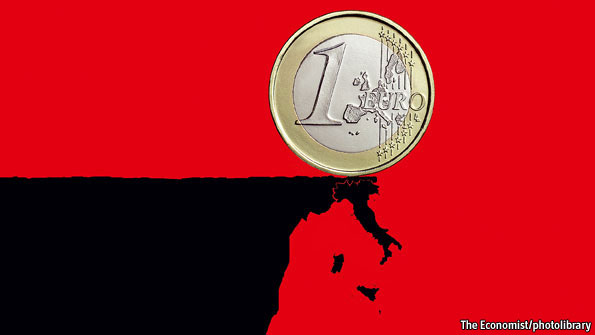Actually Enrico Letta is since 2004 Vice-Chairman of the Aspen Institute Italy:
– Enrico Letta Appointed Italian Prime Minister, Asked To Form Government (Huffington Post, April 24, 2013):
ROME — Italy’s president appointed Enrico Letta as premier-designate Wednesday, asking him to form a coalition government representing Italy’s main parties to end two months of political paralysis and put the country back on the path of reform and growth.
Letta, a 46-year-old center-left lawmaker and No. 2 Democratic Party leader, said he accepted the job knowing it’s an enormous responsibility and that Italy’s political class “has lost all credibility.”
President Giorgio Napolitano charged Letta with putting together a coalition government of the Democratic Party and the center-right party of Premier Silvio Berlusconi, the two biggest blocks in Parliament, and said he had received assurances that both would support Letta.
“It is the only possible solution,” Napolitano said, calling Letta the figure who could rally “a broad convergence of the political forces that can assure a majority in both houses to the government.”
Letta also represents something of a new generation in Italian politics, after the traditional guard has been discredited by scandals, infighting and inertia. In a perhaps scripted but nevertheless significant gesture, Letta drove himself to the presidential palace to accept the job as premier in his own Fiat, with car seats in the back. Normally politicians are driven around town with an accompanying motorcade.
These “auto blu,” as the chauffeured cars are known, have become the despised emblems of the privileges of Italy’s political elite – sentiments that led a quarter of Italians to vote for the anti-establishment 5-Star Movement, which campaigned on a platform of sending Italy’s traditional political classes packing.
Letta on Thursday begins consultations on forming a Cabinet that can win cross-party support and a vote of confidence in Parliament.
His improbable candidacy came after the chief of his Democratic Party, Pier Luigi Bersani, resigned after failing to form a government following inconclusive February elections and then failing to unite the party behind a candidate for president.
Bersani had refused to deal with Berlusconi, preventing the possibility of a coalition government.
Letta is a moderate figure along the lines of Bersani, to whom he has been a loyal deputy since 2009, firmly backing him in last fall’s primaries against Florence Mayor Matteo Renzi.
But he has one trump card: his uncle Gianni Letta is a close aide to Berlusconi, a relationship that could prove a key to shoring up a grand coalition among very uneasy partners.
Italy’s current premier, Mario Monti, hailed the selection of Letta and said he hoped he swiftly wins parliamentary approval for his government. “With the responsible support of the political forces, Premier Letta will be able to consolidate Italy’s international credibility,” Monti said in a statement.
Napolitano had tapped Monti as premier in November 2011 to take over from Berlusconi after international markets lost faith that Berlusconi could push through necessary reforms to prevent Italy from succumbing to the debt crisis.
Monti’s technocratic government passed a host of deeply unpopular austerity measures, including tax hikes and pension reforms – measures that hurt Monti’s popularity at the polls, where his new party took only 10 percent of the vote in the Feb. 24-25 elections.
The third-largest vote-getter, the 5-Star Movement, has vowed to be in opposition to any government. The movement’s comic-turned-leader, Beppe Grillo, denounced the selection of Letta and accused Italy’s traditional parties of closing ranks in an act of self-protection.
“In the meantime, the economy doesn’t wait. Every minute a business is closing. We could reach the point of no return by this autumn,” he warned on his blog.
Letta said his main priority was to address the “enormous, unbearable” economic emergency in the euro-zone’s third-largest economy: Italy has been in recession for over a year and unemployment is at 11.6 percent with youth unemployment at 37.8 percent.
“It is a very difficult situation, fragile, unprecedented,” Letta said. He promised as a second priority to enact a host of political reforms, including a reduction in the number of parliamentarians and a reform of the electoral law.
Inconclusive Feb. 24-25 elections left the Democrats and their allies in control of the lower Chamber of Deputies but not the Senate.
Napolitano reportedly chose Letta over Giuliano Amato, a 74-year-old two-time premier who also would have had the support of both major blocks in Parliament.
In doing so, Napolitano was giving the Democrats a chance to regroup under a new leader after imploding over Bersani’s missteps, while answering a demand from voters for Italy’s largely discredited old political guard to give way to a new generation.
In 1998, Letta became at age 32 the youngest government minister in Italy’s history when then-Premier Massimo D’Alema named him minister for European policy. He had other ministerial posts in subsequent center-left governments and in 2008 won a Parliament seat with the newly formed Democratic Party.
He has written several books about European policy. He spent his childhood in Strasbourg and studied international law before entering politics.
Italy is uttterly and totally …


